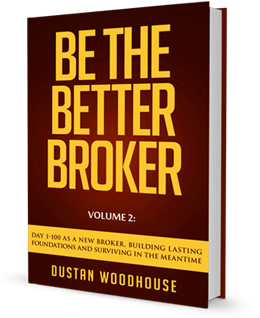An excerpt from Volume 2 of Be the Better Broker.
Fraud — just don’t.
Some clients may think that bending the rules to get their home is “no big deal,” maybe not for them.
For you, this kind of thing puts your livelihood on the line.
And your license is worth far more than a few thousand dollars.
Learn how to say no to such clients. ‘No, I cannot work with you’
Your job may well be miracle worker, but it isn’t ‘crooked-miracle-worker’. Your job is to be the expert, the licensed professional, the expert acting with integrity at all times.
Don’t bend rules for friends or family either. They’ll be just as quick to point the finger at you when the slightest pressure is applied to them by any form of authority that gives off the impression of the mortgage, title, or home being placed in jeopardy.
Also, friend & family files are the most closely scrutinized ones, especially during a pre-funding audit.
Backfires
If you cross the line, you may think you’re doing the client a favour, in fact you are doing nobody any favours, least of all yourself. The client will likely view you as being bent, crooked, shady… even though you fudged it for their benefit not your own.
The thing is that few among us want to win by cheating, it feels dirty. And even when it is someone else doing the cheating to our benefit, we still feel dirty.
Nobody wins.
The real question, the one rarely asked in these instances, is; how likely is this client to refer a co-conspirator in a fraudulent transaction?
The answer; not very.
Odds are the client will never want to see you again — ever. Even though you got it done for them, they’ll feel (rightly) they were a part of something dirty and wrong. They will 100% distance themselves from you.
All this said, mortgage fraud is in fact rare… you just rolled your eyes didn’t you? Read on.
A 2016 survey of Canadian mortgage brokers and agents asked, “How concerned are you with mortgage fraud in Canada?” Of respondents, 14.3% said they were very concerned and the problem was rampant, and 23.8% indicated they were somewhat concerned, but not a huge problem.
In fact, in the previous year, 54 fraudulent (funded) transactions had been identified out of 590,000: less than .01% of the total market. Yet 38 percent of Brokers polled were somewhat to very concerned about fraud.
That is a massive delta between perception and reality.
This seems to be an instance where we know that we ourselves are individually behaving properly, yet are somehow convinced the “other” is up to no good. This is very Canadian — the “I’m OK, but I’m not too sure about the other guy” mindset.
Conclusion
Did you know that mortgage application software records every single keystroke of every single application? Are you changing income numbers around?
Deleting properties?
Editing details?
The history of every version of that application is recorded.
And this is why so few fraudulent files fund in the end.
The bottom line; Always assume that every email you type, every conversation you have, is being monitored by the regulator. As such;
Be smart.
Be honest.
Be respected.
Be referred.
Be above reproach.
DW

thats very very true, Dustin.
I see you walked in our shoes …